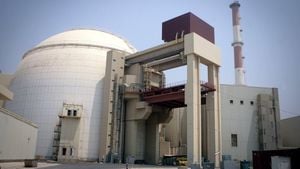The violence and destruction stemming from the Gaza conflict has left the education system on the brink of total collapse. Reports indicate over 90% of schools have been severely damaged or outright destroyed due to relentless bombings.
The recent emergency meeting of the Palestine Children Educational Affairs Council highlighted these pressing concerns. This meeting, held at the Arab League's headquarters, focused on the urgent needs of Gaza's education sector amid the continuing Israeli aggression.
Ali Hussain Al Jarhab represented Qatar at the meeting, discussing the dire state of education. Ambassador Saeed Abu Ali, the Arab League's Assistant Secretary-General, expressed the need for comprehensive support mechanisms to revitalize the devastated education sector.
Education has always played a pivotal role for the Palestinians, providing not just knowledge but also resilience. Minister of Education Dr. Amjad Barham stated, "Israeli occupation forces have destroyed all Palestinian schools and universities," highlighting the magnitude of the devastation.
The statistics are staggering; more than 80% of universities have been rendered unusable. Overall, the conflict has affected over 630,000 students with casualties among students and teachers reaching alarming numbers.
Dr. Barham noted, "9,500 students have lost their lives due to the aggression," underlining the brutal cost of the conflict on future generations. The loss doesn’t merely pertain to lives; it encompasses the dreams, ambitions, and potential of countless young individuals.
Places of learning, once havens for education, have now become makeshift shelters. Many schools under the United Nations Relief and Works Agency (UNRWA) have had to convert to emergency shelters for those displaced by the violence.
Students have suffered incredibly due to the conflict; 40,000 high school students could not sit for exams this year, significantly impacting their futures. Over 88,000 university students are today facing uncertainties, with many reporting trauma and emotional distress amid the chaos.
Prof. Omar Milad from Al Azhar University Gaza painted a grim picture of the academic toll this warfare exacted. He stated, "Al Azhar University has been devastated, leaving students and faculty helpless."
Among faculty members, losses are similarly shocking, with many educators having lost their lives or their livelihoods due to the destruction of their workplaces. This highlights the broader humanitarian crisis enveloping the region.
International responses to this crisis are being mobilized, with Qatar participating actively to convey the urgent needs for financial and material support. Education needs immediate revival, not only to restore physical classrooms but to preserve the psyche and morale of the youth.
Gaza’s education system faces multifaceted challenges, including the need for new materials, infrastructure rebuilding, and psychological support for traumatized students. The coalition of Arab nations is appealing for joint efforts to create safe places for students to resume their education.
With young lives and futures hanging by threads, educators and policymakers are tirelessly advocating for immediate assistance and long-term solutions. The possibility of hope lies within the support and solidarity of the global community.
This situation begs the question of how the international community can prioritize Gaza’s educational revival. Will there be substantial support to safeguard the educational framework central to securing Palestinian futures?



